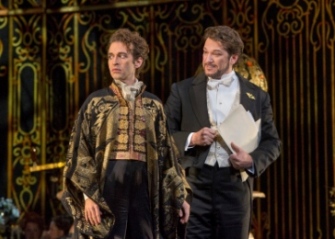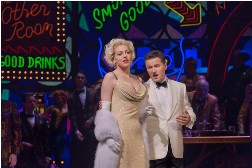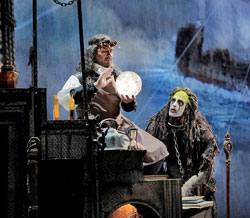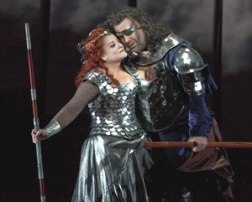Category: "Opera"
Review: Die Fledermaus
Jan 16th

Anthony Roth Costanzo and Paulo Szot in Die Fledermaus
(©Ken Howard/Metropolitan Opera)
The Metropolitan Opera appropriately ushered in the New Year with Die Fledermaus, Johann Stauss Jr.’s classic comedic operetta set on New Year’s Eve. Revised with new English language lyrics and dialogue by theatrical veterans Jeremy Sams and Douglas Carter Beane (Sister Act, Cinderella) respectively, the glittering production manages to entertain despite some glaring missteps that rob the effervescent work of much of its fizz.
Updated to turn-of-the-century Vienna, the new version directed by Sams retains the familiar story of duplicitous Gabriel von Eisenstein (Christopher Maltman) and his long-suffering wife Rosalinde (Susanna Phillips) attending a glittery New Year’s Eve ball at the palatial home of Prince Orlofsky (Anthony Roth Costanzo) at their behest of their friend Dr. Falke (Paulo Szot). Falke is intent on getting revenge on Eisenstein, who is supposed to report to jail for having assaulted a policeman, over a slight years earlier, while Rosalinde is determined to catch her cheating spouse in the act. To that end, she poses as a Hungarian countess who her oblivious husband is promptly intent on seducing. Also present at the ball is the couple’s maid Adele (Jane Archibald), who has pretended to be visiting her dying aunt, and the jail’s warden Frosch (Danny Burstein), disguised as a Frenchman. Farcical complications ensue.
Unfortunately, the usually lighter-than-air piece has here been burdened with reams of expository dialogue that slows the action down and results in a bloated running time of nearly four hours. Both the book and lyrics feature loads of broadly comic, often contemporary jokes that frequently border on bad taste, including an ill-conceived Holocaust reference. The new English language lyrics, often on the order of “Let’s canoodle, my strudel,” prove frequently awkward for the singers, even if they don’t fully detract from the pleasures of the gorgeously melodic score.
Even such seemingly sure-fire comic interludes as Frosch’s fourth wall-breaking address to the audience fall short, despite the spirited vaudevillian shtick by Broadway veteran Burstein (South Pacific, Follies). The comedy routine stuffed with gags referencing such targets as Andrew Lloyd Webber, The Sound of Music, The Cabinet of Dr. Caligari and child molesting priests produces some genuine laughs but goes on far too long.
Other vulgar touches include the sexily revealing costumes worn by the gorgeously lithe dancers at the party and such bizarre aspects of the lavish set designs as the Christmas tree and menorah decorating the Einsenstein’s home.
To be fair, goofy humor has always proved an integral element to productions of this lighthearted work. But the tone-deaf aspects of most of the comic flourishes prove more wearisome than exhilarating.
Still, under the spirited conducting of Adam Fischer, the orchestra and singers do ample justice to the music. Particular standouts include Michael Fabiano, displaying a gorgeous tenor as Rosalinde’s ardent suitor, Alfred; countertenor Costanzo, unveiling thrilling high notes as the outlandishly costumed Orlofsky; and Szot, whose resonant baritone remains ever thrilling.
Metropolitan Opera, Lincoln Center. 212-362-6000. www.metoperafamily.org. Through Feb. 22.
Review: Rigoletto
Feb 5th

It’s not often you see a half-naked pole dancer cavorting onstage at the Metropolitan Opera House. But that’s just one of the many startling sights in their new production of Rigoletto. Staged by theater director Michael Mayer (Spring Awakening, American Idiot) in his Met Opera debut, this audacious version of Verdi’s 1851 classic has been reset to 1960’s era Las Vegas. And while the updating has the sort of logistical flaws typical of such operatic revampings, it’s an entertainingly robust and imaginative rendition that should attract fresh audiences.
There’s no doubt that we’re no longer in 15th century Italy from the first glimpse of Christine Jones’ lavish set design of a Vegas casino emblazoned with neon signs and the performers clad in Susan Hilferty’s tacky, brightly-colored costumes. Here, the Duke (Piotr Beczala) is a womanizing, Sinatra-style lounge singer in a white dinner jacket, grabbing a microphone to sing his aria “Questa o quella” to an adoring crowd.
The hunchbacked Rigoletto (Zeljko Lucic) is his sidekick, an abrasive, Don-Rickles type comedian. The basic story, adapted from a Victor Hugo play, manages to come through clearly in this conception. The Duke seduces Rigoletto’s beautiful virginal daughter Gilda (Diana Damrau), thereby incurring his wrath. He hires a killer, Sparafucile (Stefan Kocan), to exact revenge, with inevitable tragic results.
This sort of thing has been done many times before, with Rigoletto in particular having undergone numerous transformations in its long performance history, including a famous version staged by Jonathan Miller for the English National Opera that was set in 1950’s Little Italy. But the opera, unlike certain others in the standard repertory, is strong enough to endure such tampering. Here, even the jarringly slang-laden translation delivered via surtitles is more amusing than heretical.
And, as is usual for the Met, the production is beautifully sung. Polish tenor Beczala does beautifully by such familiar arias as La donna e mobile” while delivering a smoothly charismatic performance. Serbian baritone Lucic makes a strong vocal impression as the Duke, even if his acting leaves something to be desired. German soprano Damrau sings luminously as the doomed Gilda, and Slovakian bass Kocan makes for a memorably oily hit man, inspiring chills with his deep rumblings. Belarussian mezzo-soprano Oksana Volkova is also memorable, both visually and aurally, as Sparafucile’s seductive sister Maddalena. Italian conductor Michele Mariotti presides over the proceedings expertly, fully mining the riches of Verdi’s score.
Clever touches abound, such as when Gilda’s near-dead body is disposed of not by bundling it into a sack but instead stuffed into the truck of a vintage Cadillac. During the storm scenes, flash of neon lightning crisscross the set. And Monterone (Robert Pomakov), the count who places a fateful curse on
Purists will inevitably scoff. But there’s no denying that this Rigoletto is a freshly invigorating, especially when compared to such recent Met productions as their drearily monochromatic Don Giovanni. And it will probably play terrifically in its Feb. 16 broadcast as part of the increasingly popular Live in HD series, shown in movie theaters around the world.
Metropolitan Opera House, Lincoln Center. 212-362-6000. www.metopera.org. Through May 1.
Review: The Enchanted Island
Jan 6th

For better or worse—depending upon your predilection--the Metropolitan Opera’s The Enchanted Island is the operatic equivalent of a juke box musical. This Baroque pastiche devised and written by Jeremy Sams uses the music of such composers as Handel, Vivaldi, Rameau, Purcell and a few lesser known luminaries to accompany a story that’s a mash-up of Shakespeare’s The Tempest and A Midsummer Night’s Dream.
Adding to the gala atmosphere of this production which appropriately premiered on New Year’s Eve, an all-star cast of singers has been assembled, including the great countertenor David Daniels as Prospero; Joyce DiDonato as the sorceress Sycorax (a character only mentioned in Shakespeare’s play); Danielle de Niese as Ariel; and no less than Placido Domingo as the god Neptune. Add to that Baroque master conductor William Christie in the pit and a spectacular production staged and designed by Phelim McDermott and Julian Crouch and you have a special event indeed.
Which is not to say that it is entirely successful--the appropriate elements have effectively been put into place, but to what end, exactly? Certainly, the storyline, even as swirled together as it is, is groaningly familiar, and the world has not exactly crying out for yet another Shakespeare adaptation. The music is indeed gorgeous, but--considering that Peter Gelb, the Met’s general manager, has been quoted as saying that he wanted to “play the Baroque card” but in a more streamlined fashion for modern attention spans--there’s far too much of it. Running three-and-a-half often lugubrious hours, this effort taxes the patience in a way that many original works from the period do not.
Still, there’s no denying the effort, ingenuity and imagination with which this concoction has been devised. Sams’ English-language libretto often displays great cleverness in its use of familiar melodies with freshly written words, and the selection of arias, apparently by Christie, should please both aficionados and relative newcomers to the genre.
While the silly storyline lacks any emotional heft whatsoever, it does have its amusing moments, such as the appearances by the old and cranky Neptune, wonderfully played by Domingo.
It’s the stagecraft that truly elevates the proceedings. Combining vintage 18th century techniques with state-of-the-art projections and animation, it displays a wit and imagination that makes the company’s behemoth productions of the Ring cycle seem hopelessly leaden. And these effects actually work.
Needless to say, with this stellar cast there is no shortage of great singing. Besides the aforementioned singers, there are superb contributions by Luca Pisaroni, looking like he just stepped out of Beauty and the Beast, as Caliban; Lisette Oropesa, charming and vocally crystalline as Miranda; and another terrific countertenor, Anthony Roth Costanzo, as Ferdinand.
For those unable to get to the Met, or afford those high ticket prices, be advised that The Enchanted Island will be broadcast in movie theaters nationwide Jan. 21 as part of The Met: Live in HD series.
Metropolitan Opera, Lincoln Center. 212-362-6000. www.metopera.org.
Review: Don Giovanni
Oct 21st

It’s easy to imagine that the Metropolitan Opera has by now adopted a “damned if we do, damned if we don’t” mentality. If they attempt to give operatic masterpieces a fresh, updated spin—ala Luc Bondy’s controversial production of Tosca a couple of seasons back--they run the risk of having the results loudly booed and denigrated. On the other hand, if they present a warhorse in a staid, traditional production, they’re criticized for not taking artistic chances.
Such is the case with the recently opened revival of Mozart’s Don Giovanni. The project certainly seemed promising on paper: per Peter Gelb’s recent leanings, a notable theater director—in this case Michael Grandage, the former artistic director of London’s Donmar Warehouse—was given his Met debut. And the much lauded Polish baritone Mariusz Kwiecien was slated for the title role.
Alas, the stars were not in alignment. Grandage--who in recent years has brought such exciting theatrical productions as Frost/Nixon, Hamlet and Red to New York--seems to have fallen asleep at the switch, delivering a visually drab staging largely devoid of excitement. And Kwiecien seriously injured his back during a dress rehearsal, resulting in a heroic, last-minute substitution by Peter Mattei.
Considering that he had barely two days to prepare, Mattei acquits himself nicely (Kwiecien is scheduled to return to the role on Oct. 25). The hulking Swedish singer certainly looks the part, providing an imposing physical presence to go along with his powerful vocalizing.
He’s well supported by several of the other singers, particularly Luca Pisaroni, as dramatically convincing as he is vocally supple in the role of the put-upon servant Leporello; Ramon Vargas, who earned sustained applause for both of his gorgeous arias; and Barbara Frittoli, deeply moving as the tragic Donna Elvira.
Grandage doesn’t seem to have given any particular thought to the staging, which mainly has the singers declaiming directly to the audience in near concert fashion. There is the occasional imaginative theatrical touch, such as the flames that shoot out as Giovanni descends into hell, but it’s too little, too late. Not helping matters are the monochromatic sets and costumes designed by Christopher Oram, with the former consisting largely of massive walls lined with balconies and doors.
Musically, the evening hews to the Met’s traditional high standards, with conductor Fabio Luisi drawing a superb performance from the orchestra. He also manages the pretty neat trick of accompanying the recitatives himself, on the harpsichord.
Metropolitan Opera, Lincoln Center. 212-362-6000. www.metopera.org.
Review: Die Walküre
May 2nd
 It’s the moment everyone’s been waiting for. The ride of the Valkyries, featuring that immortal Wagner music that got seared into moviegoers’ memories thanks to Apocalypse Now. And in the Metropolitan Opera’s new production of Die Walküre, the scene doesn’t disappoint.
It’s the moment everyone’s been waiting for. The ride of the Valkyries, featuring that immortal Wagner music that got seared into moviegoers’ memories thanks to Apocalypse Now. And in the Metropolitan Opera’s new production of Die Walküre, the scene doesn’t disappoint.
Director Robert Lepage has the eight warrior sisters of Brunnhilde strapped to the movable planks of his massive set as if they were riding horses and galloping toward the audience. It’s a visually exhilarating sequence that spectacularly complements the stirring music.
Not everything works quite as well in this second installment of the Met’s ambitious new Ring cycle. Despite the ever malleable set and the series of projections that convey everything from a bleak forest to a ring of fire, the evening often suffers from a static visual quality. But the brilliance of the music and performances more than compensates.
James Levine conducts the five hour-plus evening in thrilling fashion, skillfully handling the score’s intense demands in a manner that is all the more impressive considering his recent health problems. And a truly stellar cast has been assembled, all of them in top form.
Bryn Terfel, thankfully shorn of the silly haircut he sported in Das Rheingold, is a physically and vocally commanding Wotan, easily convincing us of his godliness, while Stephanie Blythe’s formidable Fricka is more than his match. As the rebellious warrior daughter Brunnhilde, Deborah Voigt delivers an outstanding performance, nailing her character’s classic high-C battle cries of “Hojotoho!” with stunning ease and dexterity. German tenor Jonas Kaufman and Eva-Marie Westbrook are deeply moving as the lovestruck siblings Siegmund and Sieglinde, with the former providing matinee idol handsomeness to go along with his powerhouse singing.
The astute casting of these and several other minor roles demonstrates the Met’s ability to deliver singers who not only well fulfill the physical demands of their characters but are also atypically persuasive in terms of their acting. The stellar ensemble also provides estimable marquee value, not that it was needed for this immediately sold-out run.
Metropolitan Opera, Lincoln Center. 212-362-6000. www.metopera.org.